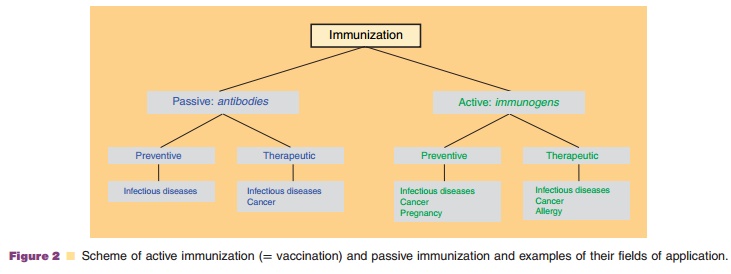Chapter: Pharmaceutical Biotechnology: Fundamentals and Applications : Vaccines
Immunological Principles of Vaccines
IMMUNOLOGICAL PRINCIPLES
After a natural infection the human immune system in most cases launches
an immunological response to the particular pathogen. After recovery from the
disease, the immunological response indeed protects the affected individual
from that disease, in the ideal case forever. This phenomenon is called
immunity and is due to the presence of circulating antibodies, activated
cytotoxic cells and memory cells. Memory cells become active when the same type
of antigenic material enters the body on a later occasion. Unlike the primary
response after the first infection, the response after repeated infection is
very fast and usually sufficiently strong to prevent reoccurrence of the
disease.
The principle of vaccination is mimicking an infection in such a way
that the natural specific defense mechanism of the host against the pathogen
will be activated, but the host will remain free of thedisease that normally
results from a natural infection. This is effectuated by administration of
antigenic components that (1) consist of, (2) are derived from, or (3) are
related to the pathogen. The success of vaccination relies on the induction of
a long-lasting immunological memory. Vaccination is also referred to as active
immunization, because the host’s immune system is activated to respond to the
“infection” through humoral and cellular immune responses, resulting in
adaptive immunity against the particular pathogen. The immune response is
generally highly specific: it discriminates not only between pathogen species,
but often also between different strains within one species (e.g., strains of
meningococci, poliovirus, influenza virus). Albeit sometimes a hurdle for
vaccine developers, this high specificity of the immune system allows an almost
perfect balance between response to foreign antigens and tolerance with respect
to self-antigens. Apart from active immunization, administration of specific
antibodies can be utilized for short-lived immunological protec-tion of the
host. This is termed passive immunization (Fig. 2).

Traditionally, active immunization has mainly served to prevent infectious diseases, whereas passive immunization has been applied for both prevention and therapy of infectious diseases. Through recent developments new potential applications of vaccines for active immunization have emerged, such as the prevention of other diseases than infectious diseases (e.g., cancer) and for the treatment of substance abuse (e.g., nicotine addiction). Such vaccines are referred to as therapeutic vaccines. The difference between passive and active immunization for preventive and therapeutic applications is outlined in Figure 2. Since antibody preparations for passive immunization do not fall under the strict definition of a vaccine, they are not discussed here.
Related Topics